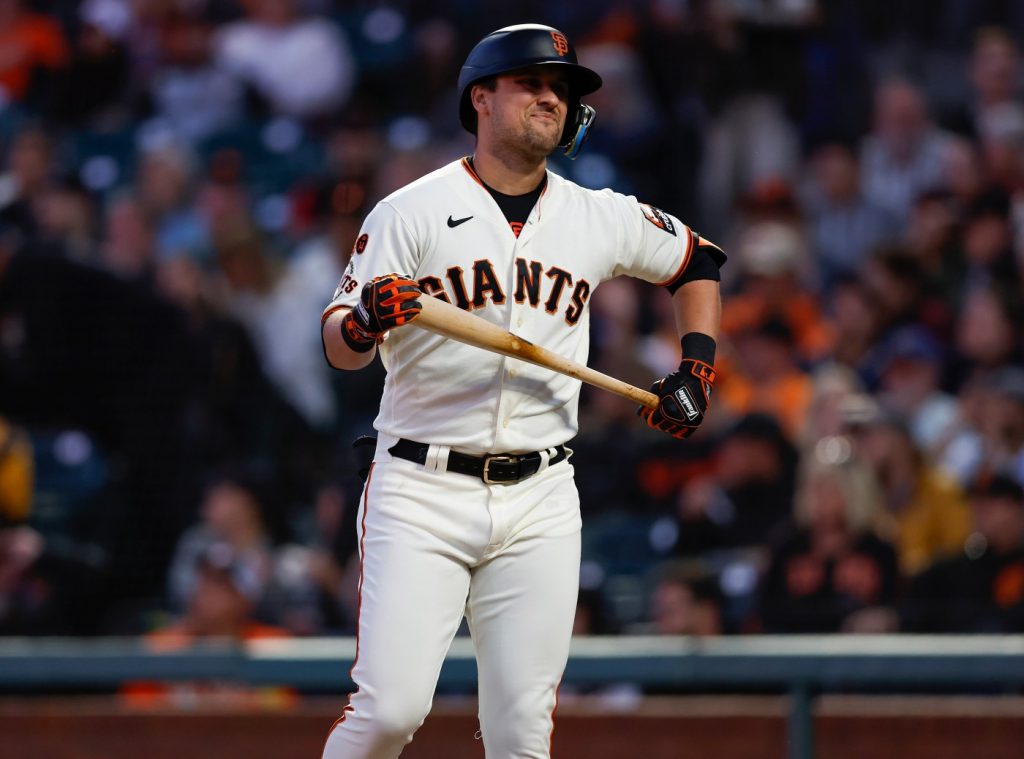The San Francisco Giants’ president of baseball operations, Farhan Zaidi, pushed back Monday that the organization did anything untoward in their handling of former third baseman J.D. Davis, who went unclaimed on waivers and was released.
Because of a clause in the collective bargaining agreement, Davis will receive only 30 days of his prorated salary as termination pay, a sliver over $1 million, rather than the full $6.9 million he was awarded by an independent arbitration panel.
“It is a big priority for us to take care of our players,” Zaidi said over Zoom. “Whenever we have a situation where we have a player who winds up parting ways with the organization it’s not going to be a walk in the park. There’s going to be an element of it that’s difficult because of the circumstances. But we always try to handle these circumstances professionally and to the best of our abilities.”
Under previous CBAs, all arbitration-eligible players’ salaries were not guaranteed until Opening Day. In the latest version, which runs from 2022-26, protections were added for players who settled out of court but not those who took their teams to trial.
Davis filed at $6.9 million, the team at $6.55 million, and now the Giants pocket almost all of it over a difference of $350,000. All five of the Giants’ other arbitration-eligible players agreed to contracts out of the courtroom.
Because he was released with 17 days to go until Opening Day, Davis qualified for 30 days of termination pay. He would have received an additional 15 days of his salary — another half-a-million dollars — if the move had been made two days later.
“Everything we’ve done in this case is well within our rights as a team. I think that’s recognized; it’s very cut-and-dry in the CBA,” Zaidi said. “… We try to reach an agreement with all of our arbitration-eligible players, him included. Sometimes it happens, sometimes it doesn’t.
“We certainly made offers to all of our players, offers that could have been accepted. We negotiate all those deals in good faith because no matter what might happen we always prefer to get our cases done than go to hearing.”
Davis found himself in this unfortunate situation because of the Giants’ late signing of Matt Chapman, a college teammate of his who also cost him the third base job at Cal State Fullerton.
With Chapman manning the hot corner, designated hitter occupied by Jorge Soler and Wilmer Flores already available as a versatile right-handed bat off the bench, there wasn’t a roster spot for Davis.
“We did spend last week kind of canvassing the league for trade interest and didn’t really get a lot of traction there,” Zaidi said. “I recognize that the timing of this probably influenced what the market was like. I think if the wheels for this had been put in motion earlier this offseason, it would have been different. But they weren’t. That’s just the reality.”
Teams understood that, soon, they would be able to sign Davis for pennies on the dollar and not have to part with any prospect capital in a trade. Now, Davis is in a bind, without a team just over two weeks until the season and unlikely to match the figure he was originally owed, despite being a 2.2-WAR player last season, according to FanGraphs.
“Obviously the financial component was a constraint for teams that we heard about,” Zaidi said, declining to say whether the Giants offered to pay down a portion of his salary. “I think we would have been open to any construct that would have made sense for both us and the player. Obviously we didn’t match up in that way.”
Related Articles
Latest round of cuts brings SF Giants’ bullpen competition into clearer focus
How SF Giants’ rotation questions impact their bullpen construction
SF Giants split-squads: Lee records another hit in loss to Mariners, Murphy walks off White Sox
With lots of Ichiro in his game, Jung Hoo Lee finally gets to meet his ‘idol’
SF Giants place J.D. Davis on waivers; why he stands to lose millions
Zaidi disputed the notion that the saga will harm the organization’s reputation with players.
“I just completely disagree,” Zaidi said. “Just talk to the players on our team and how they feel about how the organization treats them, the communication with the manager, the coaching staff, the front office. I push back really strongly on this point.
“When you part ways with a player, no matter what the circumstances, it’s often difficult. It often feels personal to the player. I’ve been in three organizations and seen this a lot. It’s just the reality of the business side of things.
“As a front office person you can shout from the rooftops it’s never personal, but I also understand from a player’s standpoint it’s always going to feel personal. This is their life, their career.”


